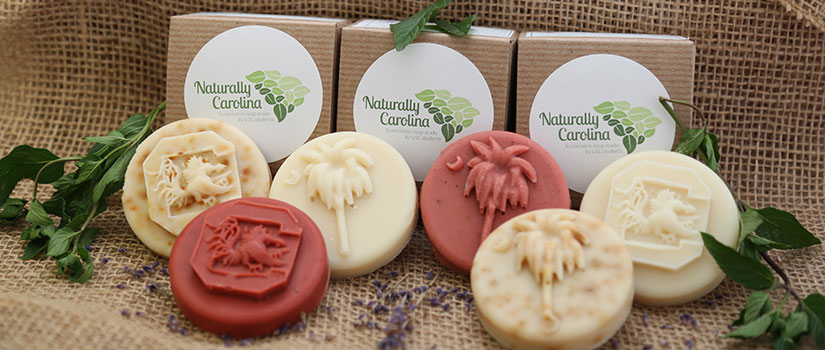Posted December 15, 2016
By Rebekah Friedman, development coordinator
Tom Syfert likes to tell people that it all starts with Chicken Finger Wednesday.
Each week, french fries and chicken fingers are cooked to crispy perfection in vats of vegetable oil across the University of South Carolina’s dining facilities. Just a few years ago, the university paid to get rid of the oil used by its cafeterias — between 300 and 400 gallons each month. Syfert would know. As the university’s director of environmental health and safety, disposing of waste on campus is part of his job. That’s why he partnered with Green Energy Biofuels. Now, instead of paying someone to take the oil, USC sells it for a profit so that it can be converted into clean-burning biodiesel for university vehicles.
It’s a sustainability success story that many on campus have heard before, but there’s another chapter that School of Journalism and Mass Communications students are helping to write.
When vegetable oil is converted to biodiesel, glycerin is a byproduct. Like the oil, Syfert has found a use for it as well. Glycerin can be blended with other natural ingredients to make soap. The final product? A selection of USC-themed Naturally Carolina soaps, available for purchase on Etsy. It’s no simple task bringing the soap from the fryer to the buyer, but it’s possible, in part, thanks to a marketing plan developed by students in The Carolina Agency.
The Carolina Agency is a class offered by the School of Journalism and Mass Communications that operates as a full-service, integrated communications firm. Each semester, TCA students assist clients in need of everything from public relations to websites to social media to graphics to large-scale strategic communications plans.
“Clients like working with TCA because we provide a fresh, current outlook and work diligently to provide the client with what they need to be successful,” says faculty adviser Dr. Jeff Ranta.
For Syfert, getting students to market the product was a no-brainer. Naturally Carolina is a subsidiary of Sustainable Carolina, the student branch of the university’s Office of Sustainability. Providing experiential learning is central to the organization’s mission. In addition to the branding and marketing work TCA has done, Syfert’s sustainable projects class helped figure out how to make the soap, a marketing class provided demographic research, and a sales class designed flyers. And students keep production moving by making the soap themselves in Naturally Carolina’s Benson Building lab.
“The overall goal of this is to teach the students how to develop a product, market a product and sell a product, and the money’s going to go back into Sustainable Carolina,” Syfert says.
Naturally Carolina first enlisted the help of TCA in the spring of 2016. A team from that class developed the logo as well as the packaging — recycled cardboard boxes cleverly filled with shredded pages from The Daily Gamecock, the university’s student newspaper. The summer 2016 team worked to take the business worldwide by setting up an online Etsy store, complete with high quality photographs of the soaps. It was a big step up from selling them at the local farmers market. Most recently, a five-member team in the fall 2016 class developed a T-shirt design and a fresh, modern website. The students also made it easier for potential buyers to find the soap online by improving its search engine optimization.
Syfert has to pitch the business to new teams of TCA students at the beginning of each semester, but so far, it’s been an easy sell.
“I picked Naturally Carolina for the story that goes along with the company,” says Claire Kudlata, a senior public relations major who served on TCA’s fall 2016 team. “I don’t know of any other company that has started with the goal of keeping all production and marketing by students.”
Not only has TCA helped Naturally Carolina grow its business, it’s given journalism students like Kudlata a chance to flex their marketing muscles.
“One of my biggest roles this semester was creating a website for Naturally Carolina,” says Kudlata. “Learning how to successfully create a website from start to finish is a very important skill in the journalism field. This will help me stand out when I’m searching for a full-time job in the spring.”
Why soap? Syfert jokes that soapmaking is in his blood. His brother makes soap for Proctor and Gamble, and his German ancestors made it for a living. He says other universities have attempted similar initiatives, but USC’s is the first to gain traction, likely because of the work that’s been put into making a sustainable product that’s also appealing to customers.
The soap comes in three original varieties — warm lavender, cool mint and cinnamon spice — as well as a rotating selection of seasonal options like zesty lime and lifting lemon. If they sound good enough to eat, that’s because they are. “All materials are completely organic and safe for your skin,” says the website. “You could probably eat our soap, but it is not suggested.”
As the name suggests, Naturally Carolina prides itself on its use of natural ingredients such honey, cocoa butter, organic olive oil and essential oils. And the Carolina connection is part of the formula, too. Soaps come in three shapes: palmetto trees, Gamecock block C logos and the intertwined C and S made popular by the Carolina baseball team. The company has also experimented with custom molds like the one for the National Advocacy Center.
But the best part is the role that students play in each step of the process.
“Once I get out of the way, things go well,” says Syfert, laughing. “But they really do a good job. And they can be proud because this is all their stuff. This is all USC student-made.”
